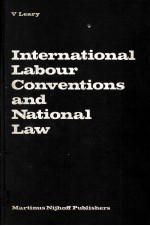

INTERNATIONAL LABOUR CONVENTIONS AND NATIONAL LAWPDF电子书下载
- 电子书积分:9 积分如何计算积分?
- 作 者:VIRGINIA A.LEATY
- 出 版 社:MARTINUS NIJHOFF PUBLISHERS
- 出版年份:1982
- ISBN:9024725518
- 页数:191 页
Introduction 1
CHAPTER 1. Labour Conventions and National Law 6
1. The Norms of ILO Conventions 7
2. Obligations of States Ratifying ILO Conventions 9
3. International Legislation? Model National Laws? Treaties? 11
4. Ratification of Labour Conventions 13
5. Conclusion 13
CHAPTER 2. The ILO Supervisory System and Problems of Auto-matic Incorporation 17
1. The ILO Supervisory System 17
2. Development of Supervisory Committees' Concern Regarding Automatic Incorporation 20
3. States Invoking Automatic Incorporation as Guaranteeing Con-vention Implementation 25
3.1. Mexico 25
3.2. Colombia 26
3.3. Guatemala 28
3.4. Argentina 29
4. States Rarely Invoking Automatic Incorporation as Guaran-teeing Convention Implementation 29
4.1. France 29
4.2. The Netherlands 30
4.3. Switzerland 30
5. Conclusion 31
CHAPTER 3. Elements of Automatic Incorporation 35
1. Status (Force of Law) of Treaties in National Legal Systems:Automatic Incorporation and Legislative Incorporation 35
2. Direct Application of Treaty Provisions (The "Self-Executing" Problem) 38
3. The Rank or Hierarchy of Treaty Provisions 40
4. Conclusion 41
CHAPTER 4. The System of Automatic Incorporation in Selected States 44
1. Constitutional Provisions for Automatic Incorporation 44
1.1. The United States, Argentina and Mexico (Federal States with Similar Constitutional Provisions) 44
1.2. France 47
1.3. The Netherlands 48
2. Automatic Incorporation Without Express Constitutional Provisions 49
2.1. Switzerland 49
2.2. Italy (Quasi-Automatic Incorporation) 49
3. Conclusion 50
CHAPTER 5. The Concept of Self-Executing Treaty Provisions 54
1. The Doctrine of Self-Executing Treaty Provisions in the Law of the United States 55
1.1. Origin of the Doctrine 55
1.2. Definition of Self-Executing Treaty Provisions 56
1.3. Criteria for Determination 57
1.3.1. Intention of the Parties 57
1.3.2. Precision and Detail of Language 58
1.3.3. Subject Matter as Criterion—Separation of Powers Question 60
1.4. Confusion Regarding the Doctrine 63
2. The Concept of Self-Executing Treaties in Other Automatic Incorporation States 65
2.1. The Netherlands 65
2.2. Switzerland 68
2.3. France 68
2.4. Italy 69
2.5. Argentina and Mexico 70
3. Conclusion 70
CHAPTER 6. National Courts and the Self-Executing Nature of ILO Convention Provisions 77
1. United States—The Warren Case 77
2. Argentina 82
2.1. The Haras "Los Cardos" Case 82
2.2. The Roa Case 87
3. France 88
3.1. The Klaiss Case 88
3.2. The Castanie Case 90
3.3. The Compan-Vaquer Case 91
4. Conclusion 92
CHAPTER 7. ILO Supervision and the Self-Executing Nature of Convention Provisions 96
1. Non-Self-Executing Provisions of ILO Conventions 96
2. U.S. Inquiry to ILO 98
3. The ILO and Mexico: Efforts to Clarify the Problem of Self-Executing Convention Provisions 101
4. Language as Indicating Self-Executing Nature of Convention Provisions 105
5. Conclusion 112
CHAPTER 8. Relative Rank of Labour Conventions and Con-flicting National Norms 116
1. Preliminary Note: Separation of Powers Question—Efforts to Reconcile Conflicting Treaties and Laws 116
2. National Legal Systems and the Relative Rank of Treaty Pro-visions and National Norms 117
2.1. Primacy Given to National Laws if Later in Time 118
2.1.1. United States 118
2.1.2. Argentina 119
2.1.3. Mexico 120
2.1.4. Italy 120
2.2. Primacy (in Principle) Given to Treaty Norms 120
2.2.1. France 120
2.2.2. Switzerland 122
2.2.3. The Netherlands 123
3. ILO Conventions and Conflicting National Norms 124
3.1. Conflict with National Constitution 124
3.2. Convention Norms in Conflict with Earlier Laws 125
3.3. Convention Norms in Conflict with Subsequent Laws 127
4. Conclusion 132
CHAPTER 9. Practical Problems in Effective Application of ILO Conventions 137
1. ILO Concern about Practical Application of Conventions 137
2. Judicial Decisions and Uncertainty Concerning Status of Con-ventions 139
3. Need for Express Repeal of Earlier Conflicting Legislation 142
4. Special Publication of ILO Conventions 146
5. Conclusion 148
CHAPTER 10. Beyond Labour Conventions: Reflections on the Wider Relevance of the ILO Experience 150
1. Interaction between International Law and National Law: Signi-ficance of ILO Experience 150
2. Conclusions Concerning Incorporation of ILO Conventions in National Law 152
2.1. Where the Twain Meet: Importance of ILO Supervisory Organs in Harmonizing International Conventional Law and National Law 152
2.2. Is the Technique of Legislative Incorporation Preferable to Automatic Incorporation? 154
3. Relevance of the ILO Experience for the Future Application of Human Rights Treaties 161
4. Improving the National Application of Treaties 163
4.1. Why National Judges Are Reluctant to Directly Apply Treaties 163
4.2. Is Theory Important? 164
4.2.1. The Monist-Dualist Controversy Revisited 165
4.2.2. The McDougal Approach 166
4.3. Need for Improved Understanding of the Problem at the International Level 167
Bibliography 171
Table of Cases 181
Table of Treaties and Conventions 183
Author Index 185
Index 187
- 《弗勒希 一条狗的传记》(英)弗吉尼亚·伍尔夫(Virginia Woolf)著 2009
- 《生存技巧》(美)弗吉尼亚·威廉姆斯(Virginia Williams),(美)雷德福·威廉姆斯(Redford Williams)著;王莹等译 2000
- 《伍尔夫读书随笔》(英)弗吉尼亚·伍尔夫(Virginia Woolf)著;刘文荣译 2006
- 《素食者膳食指南》(美)Mark Messina,(美)Virginia Messina著;霍军生等译 2004
- 《你是哪种人 9型人格测验及指南 第2版》(美)戴维·丹尼尔斯(David N. Daniels),(美)弗吉尼亚·普赖斯(Virginia Price)著;程艮译 2005
- 《找对方法做好咨询》(美)维吉尼亚·拉格罗萨(Virginia LaGrossa),(美)苏珊·萨克斯(Suzanne Saxe)著;莫燕萱,胡永国译 2004
- 《我是哪种人 九型人格测验及指南》(美)戴维·丹尼尔斯(David N.Daniels),(美)弗吉尼亚·普赖斯(Virginia Price)著;程艮译 2003
- 《岁月》(英)弗吉尼亚·伍尔夫(Virginia Woolf)著;金光兰译 1997
- 《幕间》(英)弗吉尼亚·吴尔夫(Virginia Woolf)著;谷启楠译 2003
- 《资优与专才 天才儿童父母教师指南》(美)弗吉尼亚·Z.埃利希(Virginia Z.Ehrlich)著;唐世力,周卫红译 2002
- 《轻松学用Publisher 2000 中文版》(美)(J.麦卡特)Jim McCarter著;卢凌云等译 1999
- 《办公自动化Office 2000》本书编委会编 2000
- 《Microsoft Publisher 2000即学即会》(美国前景公司)Perspection著;北京博彦科技发展有限公司译 1999
- 《Publisher 2000 中文版快递》东箭工作室编著 1999
- 《Publisher 2000简明操作手册》秦颂编著 2000
- 《商品展示 引进版》(美)Robert Colborne著;张艳玲,陈平主译 2005
- 《中文版Office 2013宝典 第4版》(美)布茨基著 2014
- 《PhotoDraw 2000和Publisher 2000中文版使用速成》康博创作室编著 2000
- 《商务软件应用必备》郝志华,王涛编著 2001
- 《中文版Office 2003七合一实用培训教程》赵斌,卢盾编著 2004
